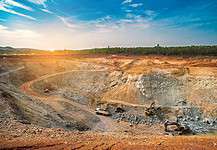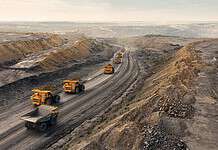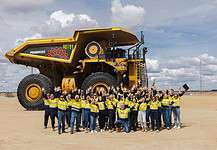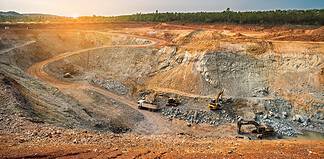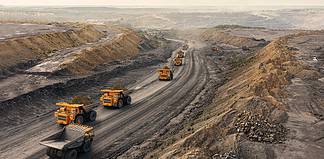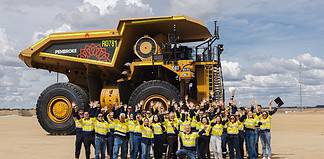WHILE not a traditional mining powerhouse like its neighbouring states, the Northern Territory has become a significant contributor to the Australian economy.
Despite Australia’s well-publicised mining downturn, the Territory continues to post constant growth in the sector.
The Frasier Institute recently surveyed hundreds of mining-related companies around the world and ranked the NT above traditional mining heavyweight WA for the best area in which to mine and invest.
The importance of mining in the NT cannot be overstated: the sector was the largest economic contributor in 2012, injecting $2.5 billion into the local economy. The minerals and energy sector contributes 20 per cent of the gross state product and directly employs 5000 people.
Minerals Council of Australia NT executive director Drew Wagner said the Territory had a very diverse range of commodities.
“We’ve got operations spread across the Territory at the moment – everything from manganese to bauxite and gold and copper, all the way down to new iron ore projects,” he said.
“We’re going to have our first diamonds produced on a commercial scale in the not too distant future.”
“It’s the buoyancy and excitement that is here – we are a small cog in a larger minerals wheel, but it’s a very attractive place to invest and [is] recognised internationally, through things like the Frasier Report.”
The projects
Bauxite
Rio Tinto’s underperforming Gove alumina refinery faces an uncertain future.
In operation since 1972, the project employs 1500 staff and has an ore reserve of 186 million tonnes.
At capacity the Gove mine can process 8.5 million tonnes per annum of bauxite and produce 3.8mtpa of alumina.
The price of alumina has dropped significantly, leaving many producers to re-evaluate their operations – including the largest employer in the NT.
Operated by its Pacific Aluminium subsidiary, Gove was hindered by expensive operating costs and Rio had warned it would mothball the project if access to a cheaper fuel source wasn’t provided.
The government is offering 195 petajoules of gas across 15 years to keep the refinery operating on a dual fuel system.
This model would allow the refinery to run on natural gas with some diesel, which would reduce operating costs in the short term until a more viable solution was found.
The gas would be supplied via a 600km pipeline, which is estimated to cost $800 million.
Mineral sands
The Tiwi Islands are home to some of the largest mineral sands deposits in the NT.L ying 80km north of Darwin, the islands have an identified inferred resource of more than 890,000t of heavy minerals.
MZI Resources has operated on the islands since 2006 and plans to compete further drilling and testing in 2014 maximise the life of its mines. Their high grade zircon, rutile and leucoxene will be exported primarily to the Asian market.
Diamonds
The Merlin diamond mine is the only one of its kind in the NT. At 65 per cent, the Merlin mine has an unusually high proportion of gem quality diamonds, responsible for its high value per carat.
The project contains an estimated 7.2 million carats, making it the second largest diamond deposit in Australia behind Argyle.
Merlin Diamonds managing director Joseph Gutnick said mining was due to re-start in coming weeks after ceasing production in 2003.
“We’re starting at 150,000 carats a year and ramping up to 250,000 carats a year and we’re very excited about it,” he said.
“Our costs of extracting the diamonds are reasonable, around $150 per carat, and the average [price] of our diamonds is around $300 to $350 a carat polished… so some good margins.
“We are hoping money generated from the sale of the diamonds will be used to increase our resource of 7 million caratsto a much higher level, because there’s enormous potential in the area.”
Merlin has publicised aspirations to open further diamond mines in the NT and currently holds the exploration rights to 23,630 square kilometres of tenements in Arnhem Land.
McArthur River project
One of the largest zinc mines in the world, the McArthur River project processes 2.5mt a year.
Expansion of the project was halted in 2007 due to environmental concerns, but with construction again underway, the site will double its capacity to 5mt per year by 2014.
The June expansion approval was welcomed by NT Mines and Energy minister Willem Westra van Holthe.
“This is fantastic news for the Territory economy and Territorians,” he said. “Working with [McArthur River Mining (MRM)] we are making real economic progress and delivering jobs to the bush.
“With the approval of Phase 3, MRM will become the largest zinc resource in the world.
“MRM and their parent company Glencore Xstrata have committed to spending 75 per cent of capital expenditure and 100 per cent of operational expenditure for the project with Northern Territory suppliers and industry.”
The $369 million development will increase the life of the mine to 2038 and increase reserves to an estimated 115mt. The project is expected to boost NT industry by $8.4 billion and will employ 735 workers by 2020.
Uranium
While WA has only begun commercial uranium mining this year, NT’s Ranger mine reached full production in 1980. Mr Wagner said the Territory was more open to the often contentious subject, which had encouraged investment.
“We can say the same thing about Queensland – they’ve only just started looking for uranium or even using the dirty ‘u’ word,” he said. “There has been forward thinking in that sense.”
The Ranger deposit is surrounded by the World Heritage-listed Kakadu National Park, but is not part of it, and is operated by Energy Resources of Australia. It is one of only three mines in the world to produce more than 100,000t of uranium oxide.
The mine was originally open cut but is transitioning to underground through a $120 million expansion, which will allow access of the Ranger 3 Deeps mineralised zone which contains 34,000t of uranium oxide – one of the most significant discoveries worldwide.
Last year was rough for ERA as the fallout from 2011’s Fukushima incident continued to lower the price and global demand for uranium.
ERA chairman Peter McMahon said the company produced 3710t of uranium oxide in 2012 compared to 2641t in 2011.
“Revenue from the sale of uranium oxide in 2012 was down at $395 million compared to $649 million in 2011,” he said.“While total sales volumes in 2012 were lower than 2011, the percentage of Ranger sourced material supplied in 2012 was greater, and this had a favourable impact of approximately $20 million on 2012 underlying earnings.
“However, this favourable impact was completely offset by higher consumables costs with the mill operating for all of 2012 compared to the lengthy suspension of processing operations in 2011.”
Challenges
While the NT economy remains in a relatively healthy state, several factors are impeding potential growth. Costs continue to rise as a strong Australian dollar reduces profit margins of commodities that are also decreasing
in value.
The local government also introduced a new tax to address the environmental legacy of mines. The one per cent levy on new and existing Environmental Rehabilitation Security Bonds will come in to effect from October 2013.
Mr Westra van Holthe said the levy was necessary to raise an initial $6.45 million to help rehabilitate mine sites. “The Country Liberals Government wants to provide a healthy environment for the next generation of Territorians.
We must act now to start repairing old mining sites around the Territory,” he said.
“The levy will go in to a Mining Remediation Fund to address legacy mine liabilities, will fund a dedicated Mining Remediation Team and will create positions for more officers to work directly on legacy issues.
“We will continue to hold a 100 per cent bond on the cost of rehabilitating existing and new mine sites.
“Mining companies are corporate citizens; they have a social responsibility to improve the environment around them. As a Government we are prepared to partner with industry to see this long term environmental problem addressed.”
The May announcement was not well received by mining companies, who accused the government of double taxing and discouraging future investment.
Association of Mining and Exploration
Companies chief executive Simon Bennison said the tax was introduced without consulting those it would affect. “In the current economic climate, it is inconceivable that a government would seek to add costs to production to fund activities that are provided as business-as-usual in other states,” he said.
“It is essential that we remove barriers to doing business in the Northern Territory to encourage investment; not add additional taxes to an increasingly costly industry.”
The Minerals Council NT Division called on the government to abandon the tax and consult with the industry on potential changes to the environmental bond system.
“There are already announcements of job losses and project developments halting or being deferred,” Mr Wagner said.
“We’re expecting more announcements in the next short period of time. “A lot of that is to do with a number of things, but the tax regime is a major part of that – it will affect our international competiveness and our cost competiveness and investment attractiveness – and that’s what we are ultimately trying to avoid and move through.”
Expansion
Despite its history in mining, the NT is still very much underexplored. Mr Wagner said the lack of infrastructure and size of the Territory was a major challenge.
“We don’t have the mining regions like the Pilbara or Central Queensland, so we have some economies of scale and transport and infrastructure and certainly some choke point,” he said. “We don’t have a single rail corridor going north-south in the NT. We have the tyranny of distance of moving from our access from our orebody to our export opportunity or port opportunity.”
To boost exports and cater for future growth, Infrastructure Australia recently announced $380 million needed to be spent on the Darwin Port.
While expansion of the port is still underway, Mr Wagner called on industry, business and government to work together to speed up the Territory’s development.
“If you expand the opportunities by providing a streamlined approval process, by providing ongoing support, by providing infrastructure and logistical support by attaching themselves to appropriate funding plans to invest in the port, then you’ll encourage the expansion of the commodity,” he said.
“This will encourage expansion of the industry and under the profits-based royalties scheme you’ll encourage a greater return to the community through money paid to the government.
“What we are calling on now is for all parties to work together to make the choices today that will have a return in 5 or 10 years time – not just the typical political turnaround of three years.
“Let’s sit down and work out what infrastructure and logistics projects are needed and work out what are the key areas that need development collectively so we can have a greater return for the greater territory community in the future.”
Outlook
Mr Wagner said that production across commodities in the NT fluctuated in 2012. “All are facing difficult times at the moment with low commodity prices generically across the board,” he said. “Until recently we had a very high dollar, although that has come back in recent weeks.”
A number of companies are waiting for conditions in the economy to improve before advancing with key projects, he said.
“The NT seems very much to be bucking the trend of what we’ve seen nationally. We’re still extraordinarily optimistic at this point in time,” he said. “We seem to be on the cusp of very great things and it’s been a long time since we’ve had a big development in this sector – we’ve had no major greenfields development for nearly 20 years.
“We just need a few planets to align and a few outcomes to pursue, whether we move collectively forward as a territory community with government and industry working together.
“The stark reality in the territory is it is still very much a brave new frontier – there is still untrodden country, there is still uncharted country and you never know what you’ll kick over the next rock that you hit.”
Advertisement


